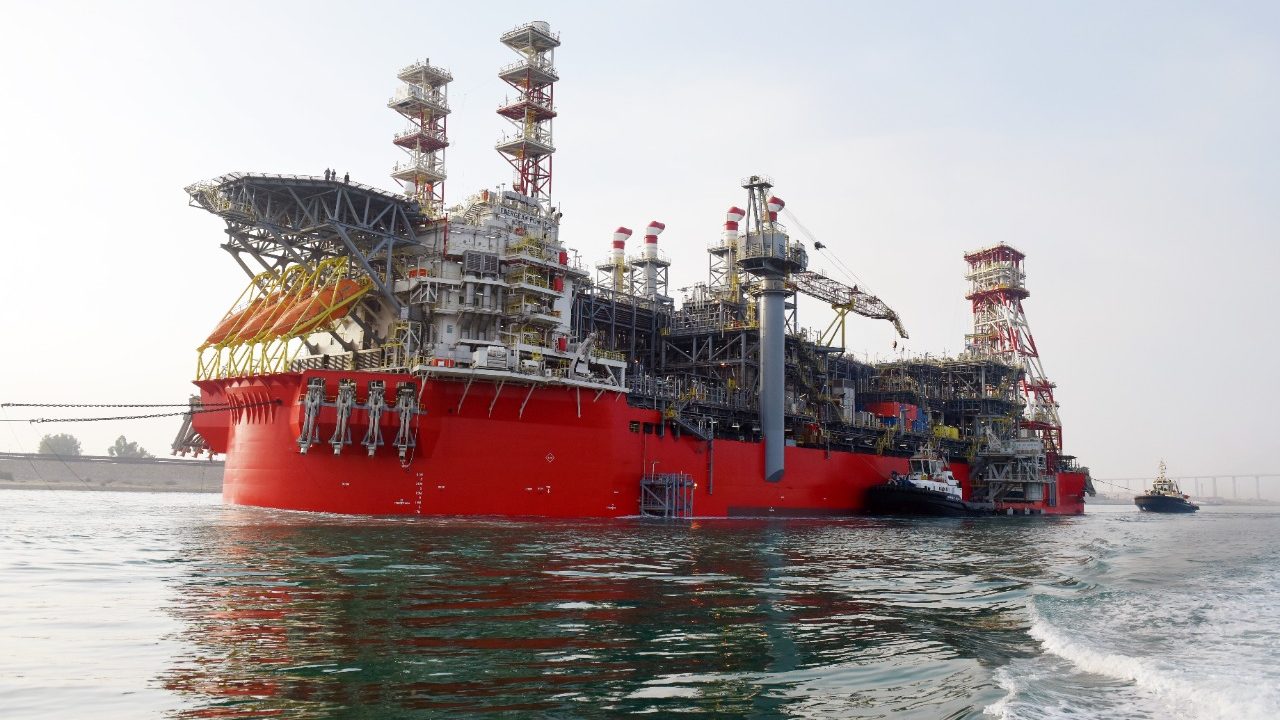Lebanon: Israel Exploring for Gas in Karish Reservoir a ‘Provocation and Hostile Act’
Offshore resource cut in two by Land of the Cedars’ expanded maritime claim
As Israel welcomed a floating gas rig from the Greek-founded, London-based Energean company to the Karish gas field off the Mediterranean coast over the weekend, the Lebanese government called on the international community to stop the exploration efforts.
The Karish gas field, which contains 1.4 trillion cubic feet of probable gas, is located within a disputed area where the Israel-Lebanon maritime border has yet to be definitively laid out. It is near Israel’s much larger Leviathan and Tamar gas fields and is expected to come online in the third quarter of 2022.
The Lebanese President’s Office declared on Sunday, “Any action or activity in the disputed area represents a provocation and a hostile act.”
Hizbullah Deputy Secretary-General Naim Qassem told Reuters on Monday that his group is was ready to take action “including force” against Israeli gas operations in disputed waters once the Lebanese government adopts a clearer policy.
Col. (res.) Dr. Jacques Neriah, a Middle East analyst at the Jerusalem Center for Public Affairs and a former foreign policy adviser to Prime Minister Yitzhak Rabin and deputy head of assessment for Israeli Military Intelligence, discussed the complexity of the situation with The Media Line.
For a long time, he said, the Lebanese refused to negotiate with Israel because they thought it would constitute recognizing the state. Also, “Hizbullah has been actively trying to stop all negotiations with the Hebrew and Zionist entity,” he continued.
During the last few years, the United States managed to get both sides to participate in indirect negotiations to set the maritime border. As both countries laid out their positions, an area of 860 square kilometers was claimed by both.
Later, explained Neriah, the Lebanese withdrew their proposal and presented an expanded demand. “The new line cuts the Karish gas field in two and adds to the 860 square kilometers [in dispute] about 600 square kilometers more,” he said.
Sami Zoughaib, an economist and research manager at The Policy Initiative, a Beirut-based think tank, explained that this second Lebanese-proposed border line, which is called “Line 29,” has not been officially adopted by the Lebanese government.
Lebanese Parliament Speaker Nabih Berri has urged Amos Hochstein, the American mediator of the indirect talks with Israel, to act in favor of Lebanon.
Berri said in a press interview, “If Hochstein does not respond and if no results are reached, the cabinet must convene to take a national unanimous decision to amend Decree 6433 and send it to the United Nations.”
Decree 6433 was promulgated by then-Lebanese President Michel Suleiman in 2011 to delineate the boundaries of the country’s exclusive economic zone. The amendment to adopt Line 29 was drafted and signed in April 2021 by then-Prime Minister Hassan Diab as well as the defense minister and the minister of public works and transport. It was then referred to the presidency for approval.
Zoughaib said the amendment is still in the drawer of President Michel Aoun, “who has not yet recognized this line, which means that now, because Israel negotiated and Lebanon has not changed its official position, the chunk of territory that is being explored by Israel is no longer [legally] challenged by Lebanon.”
Neriah argued that even if the Line 29 border were officially adopted by the Lebanese and agreed on with Israel, most of the Karish field would still be in Israeli waters.
“Even if we accept the second Lebanese line, at least half of the Karish field is still in Israeli waters,” he said.
That is why, Neriah argued, “this is definitely not a case for Hizbullah and others to say that it belongs to Lebanon and that Israel is forbidden to explore there.”
The experts agree that military confrontation is not the first avenue that will be pursued to solve the dispute.
The atmosphere was tense, said Neriah, and of course, Israel was taking effective steps to protect the Energean rig. “But I would not rush and say that we are going to come to a confrontation, because I believe that first diplomatic means will be used and certainly the Lebanese will try to raise the case to an international court and arbitration before doing anything else,” he added.
Zoughaib explained that while military confrontation is a possibility, no formal position has yet been taken by the Lebanese government or by Hizbullah.
“The government perhaps needs to act quickly and recognize Line 29 as its actual border so exploration from the Israeli side on that territory would be impossible because foreign companies would not explore disputed fields,” he said.
“I believe that all parties will turn to diplomatic contacts before any other options,” said Neriah.
He added, however, that Hizbullah or the Palestinian organizations that are related to Hamas might initiate sabotage. “This would certainly bring the area into a very sensitive situation and a possible confrontation,” he continued.
Neriah explained that Hizbullah warned, just before the May 15 Lebanese general election, that the dispute would be on the Shiite group’s agenda. If Lebanon cannot drill in this gas field, then the movement will do whatever it can to stop Israel from drilling in the area.
Zoughaib said the Lebanese people hold their government directly responsible for Israel exploring the field. This “is enabled by the Lebanese government which is captured by self-serving elites who have no regard for the public goals or for what is rightfully Lebanon’s.”
He added that in his opinion only the Lebanese army and the negotiating unit that was created by the government were doing a professional job on the Lebanese side.
However, “this work was not supported by political actors who should have applied pressure nationally and internationally to get things to where they should be,” Zoughaib said.


